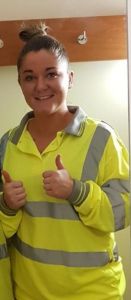Women on site: Interview with Nicky Hall
 Nicky Hall, our Commercial Analyst & Deputy QUENSH Manager has varied work experience and here we explore her year working on site. To better understand the challenges for women doing site work, we invited Nicky to answer a few questions to get an insight from a female perspective about what it is like for a woman to work both day and night shifts, away from home and in a predominantly male industry.
Nicky Hall, our Commercial Analyst & Deputy QUENSH Manager has varied work experience and here we explore her year working on site. To better understand the challenges for women doing site work, we invited Nicky to answer a few questions to get an insight from a female perspective about what it is like for a woman to work both day and night shifts, away from home and in a predominantly male industry.
Nicky was born in the UK and she has been living around the Dudley area since she was 5 years old. As a child, she was dreaming of becoming a professional football player and she had lots of pets: 2 Cockatiels, a Parrot, a Cat and a Varmarama – all of them at the same time. Although now she works behind of her desk, she is still passionate about sports practicing MMA and Yoga.
She enjoyed working on site, either alone on a mobile road worker protection unit or in a team on a CCTV Rig completing Pipework and Chamber Defect Surveys and Remediation projects. She believes the work was easy in spite of the myth that this job is heavy labour and tough. During her site career she received great feedback from all managers and supervisors, congratulating her for being one of the best Rig assistants.
How did you find out about the industry?
It was a recommendation from a friend.
What did you enjoy most while working on site?
I used to take pictures of the scenery “my office for the day” especially when I was working on day shifts.
What did you like about the job?
I liked meeting new people and travelling around the country.
What is the most challenging thing about your job?
I found it very challenging to have conversations with more than 75% of the males working in the industry, either at the depots, inductions or even on site. Sometimes they wouldn’t even acknowledge me.
What was a typical day looking like?
I will tell you about a typical shift when I was working nights, and away from home.
I would wake up around midday (1:00pm), have breakfast in the hotel from the food prepared over the weekend and stored in my takeaway fridge. It was slow mornings, getting ready, going to the gym, back to the hotel for a shower and dinner that I was heating in the microwave that I had fitted in my van. After that I had some time for myself to relax before going out on site. Around 6:00pm
I would prepare for site, ensuring I had the appropriate PPE, and then commute to the meet up location where I would have my site briefing or induction. After this we would wait for the Traffic Management to be ready. This could take between 30 minutes to 3 hours.
The actual shift started around 9:30pm and finished between 3:00am and 5:00am.
When I arrived on site I went to the marker post location, and while the rig manager was setting the pages on Wincan and I was preparing the back of the van, getting the manhole keys, lifting the chamber lid, and checking the pipe size.
I was getting the crawler camera, setting the correct wheel size, attaching camera head, and swinging the camera into the pipe.
The camera was driven through the pipe by the rig manager to complete the defect survey. In the meantime, I was ensuring cable was reeling off ok. When survey was complete, I was pulling the cable while the rig manager was reversing the camera. When I could see the back of the camera, I was getting the hook ready so when the crawler came out of the pipe, the hook would catch so it wouldn’t hit the floor and break. I was pulling the crawler camera out to prevent entering a confined space.
I would put the crawler back in the van, manually reeling up to 100 m of cable while cleaning it. When everything was back in the van we drove to the next chamber.
At the end of the shift, I dismantled the crawler camera and cleaned it. I would drive back to the to the hotel, shower, eat and go to sleep by 6:00 am.
Do you think the perception of the site operatives as a male-dominated career can be changed, and if so, how?
The predominant image of construction is that of a male-dominated industry requiring brute strength and good tolerance for outdoor conditions and inclement weather. This perception is already slowly changing with the new generations, who are more open to women in the industry. The more women will show up the less shock it will be. I could see early signs of a cultural shift in the industry.
What could be done to encourage women and make it easier for them to choose this as a career option?
I believe companies should raise awareness that this is a suitable career path and change the common mindset. There is a lot of room for career progression and the job on site is not stressful and the salary is great especially taking into consideration the hours you are working.

